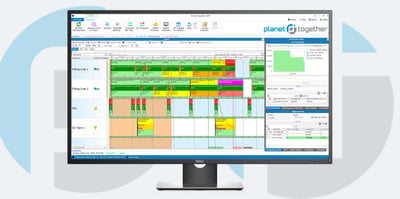Data Governance and Management
As a Production Scheduler, you're at the heart of this intricate ecosystem, orchestrating the flow of materials, processes, and personnel to ensure timely delivery of life-saving products. Amidst this complexity, the role of data governance and management emerges as a guiding beacon, steering operations towards excellence and compliance.
In this blog, we look into the vital nexus between data governance, data management, and production scheduling in the context of medical manufacturing. Furthermore, we explore the integration between advanced production scheduling tools like PlanetTogether and leading ERP, SCM, and MES systems such as SAP, Oracle, Microsoft, Kinaxis, and Aveva, elucidating their synergistic potential in driving operational efficiency and regulatory adherence.

Understanding Data Governance and Management
Data governance encompasses the framework, policies, and procedures governing the management and integrity of data assets within an organization. It delineates roles, responsibilities, and protocols for data usage, access, and security, ensuring consistency, reliability, and compliance across the data lifecycle.
Data management, on the other hand, refers to the processes and technologies employed to acquire, store, organize, analyze, and disseminate data effectively. It encompasses data integration, quality assurance, metadata management, and data lifecycle management, fostering data-driven decision-making and operational agility.
In the context of medical manufacturing, stringent regulatory requirements such as FDA's Current Good Manufacturing Practices (cGMP) mandate robust data governance and management practices to uphold product quality, safety, and traceability. Production schedulers play a pivotal role in this endeavor, as they rely heavily on accurate and timely data inputs to optimize production schedules, mitigate risks, and ensure compliance.

Integration between PlanetTogether and ERP, SCM, and MES Systems
PlanetTogether, a leading production scheduling software, empowers production schedulers with advanced optimization algorithms, simulation capabilities, and real-time visibility into production workflows. Its seamless integration with enterprise resource planning (ERP), supply chain management (SCM), and manufacturing execution systems (MES) augments its functionality, facilitating data exchange, synchronization, and orchestration across the manufacturing landscape.
Integration with SAP, Oracle, Microsoft, Kinaxis, Aveva, and other ERP, SCM, and MES systems enables production schedulers to harness the full potential of their data assets, unlocking insights, and efficiencies across the value chain:
SAP Integration: By integrating with SAP's ERP system, PlanetTogether gains access to real-time inventory data, production orders, and resource capacities, enabling more accurate and responsive production scheduling. This integration streamlines order fulfillment, inventory management, and procurement processes, enhancing operational agility and customer satisfaction.
Oracle Integration: Integration with Oracle's ERP and SCM systems facilitates end-to-end visibility and control over supply chain operations. PlanetTogether leverages Oracle's robust data infrastructure to optimize production schedules based on demand forecasts, supplier lead times, and production constraints, ensuring optimal resource utilization and on-time delivery.
Microsoft Integration: Leveraging Microsoft's Dynamics 365 suite, PlanetTogether seamlessly integrates with CRM, ERP, and SCM modules, enabling holistic business insights and process automation. This integration empowers production schedulers to align production schedules with customer demand, sales forecasts, and market trends, driving competitive advantage and profitability.
Kinaxis Integration: Integration with Kinaxis RapidResponse enables dynamic supply chain planning and execution, leveraging real-time demand signals and supply chain disruptions. PlanetTogether synchronizes production schedules with Kinaxis' scenario analysis and what-if simulations, enabling proactive risk management and decision support, especially in volatile market conditions.
Aveva Integration: Integrating with Aveva's MES solutions facilitates shop floor visibility, production tracking, and quality management. PlanetTogether leverages Aveva's real-time production data to optimize scheduling decisions, minimize downtime, and ensure compliance with regulatory standards, such as FDA's 21 CFR Part 11.
The synergistic interplay between PlanetTogether and these ERP, SCM, and MES systems exemplifies the convergence of advanced technology and data governance principles in driving operational excellence and regulatory compliance in medical manufacturing.

Best Practices for Data Governance and Management in Production Scheduling
Establish Data Governance Framework: Define clear policies, roles, and responsibilities for data governance, encompassing data ownership, stewardship, and privacy. Ensure alignment with regulatory requirements such as FDA's cGMP and ISO standards.
Adopt Data Quality Standards: Implement data quality controls and validation checks to maintain data accuracy, completeness, and consistency. Regularly monitor and audit data integrity across systems and processes.
Enable Data Integration and Interoperability: Invest in integration capabilities that enable seamless data exchange and synchronization between production scheduling, ERP, SCM, and MES systems. Leverage standardized data formats and APIs to facilitate interoperability.
Enhance Data Security Measures: Implement robust cybersecurity measures to safeguard sensitive production data from unauthorized access, manipulation, or disclosure. Encrypt data transmissions, enforce access controls, and conduct regular security assessments.
Promote Data Transparency and Accountability: Foster a culture of transparency and accountability around data usage and decision-making. Provide stakeholders with access to relevant data and analytics tools to facilitate informed decision-making and continuous improvement.
Embrace Data Analytics and Predictive Modeling: Leverage advanced analytics and predictive modeling techniques to derive actionable insights from production data. Identify patterns, trends, and anomalies to optimize production schedules, mitigate risks, and seize opportunities.
In the dynamic and highly regulated landscape of medical manufacturing, effective data governance and management are indispensable for ensuring product quality, safety, and compliance. Production schedulers play a pivotal role in this endeavor, leveraging advanced production scheduling tools like PlanetTogether and integrating them with ERP, SCM, and MES systems to orchestrate seamless production workflows.
By adhering to best practices in data governance and management, production schedulers can unlock the full potential of their data assets, driving operational excellence, regulatory compliance, and competitive advantage in the rapidly evolving medical manufacturing industry.
Are you ready to take your manufacturing operations to the next level? Contact us today to learn more about how PlanetTogether can help you achieve your goals and drive success in your industry.